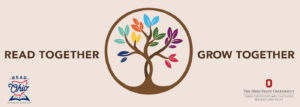
Infant/Toddler
PLUM: Preschoolers’ Language and Use of Media

Crane Center researchers are investigating how media use, both interactive (apps and games) and noninteractive (television and video), can affect young children’s language development.
Read Together, Grow Together

Get 8 tips for families on making the most of the time spent reading with your young child.
Parents’ responsivity and early language development

RIVETING RESEARCH BLOG SERIES. Poverty is shown to have negative effects on young children's language development. A mediated meta-analysis of more than 6,000 preschool children examined why by looking at whether socioeconomic risks impacts parent responsivity.
Friend or Foe? Screen time and its effects on young children

The Riveting Research blog series is a succinct summary of a new study with compelling design and implications. This month's blog examines a meta analysis study to examine the effects of screen time on young kids.
RESEARCH HIGHLIGHT: New research on the impacts of care from other adults on infant learning

A study by Crane researcher, Dr. Britt Singletary, examines how informal care from other adults can impact infant and young-child development. Dr. Singletary presents findings on cognitive and language outcomes for infants aged 13-18 months.
Kids in Columbus Study (KICS)

Kids in Columbus Study (KICS) investigates how families with young children, specifically those living in low-income households, access and use community resources that are funded each year by the city of Columbus.
Franklin County Early Care and Education Landscape Study

The Crane Center for Early Childhood Research and Policy is partnering with the City of Columbus and Future Ready Columbus to conduct a study on the Early Care and Education Landscape in Franklin County (“Landscape Study”).
The Landscape Study aims to identify salient early care and education experiences for children under the age of five in Franklin County. This includes participation in formal and informal care arrangements, caregiver beliefs and practices, and home learning activities and experience. The study also hopes to identify barriers and enablers to early care and education for families in the Columbus area.
“Don’t Look Away” book study with Schoenbaum Family Center

A survey taken by early-childhood professionals demonstrated that educators, on average, are moderately racially conscious, meaning they understand that children of color experience racism. The "Don't Look Away" book study sought to address issues of bias and increase awareness around anti-bias practices within the classroom. This white paper research shows an increase in posttest data from the baseline after participants completed the study.
RESEARCH HIGHLIGHT: Toddler media exposure and language skills development

New research examined whether the quantity of toddlers’ exposure to media was related to language skills in accordance with the American Association of Pediatrics one hour per day recommendations.
